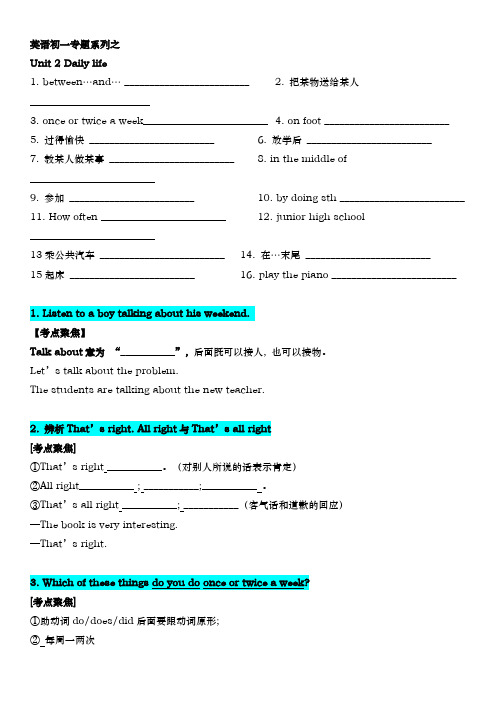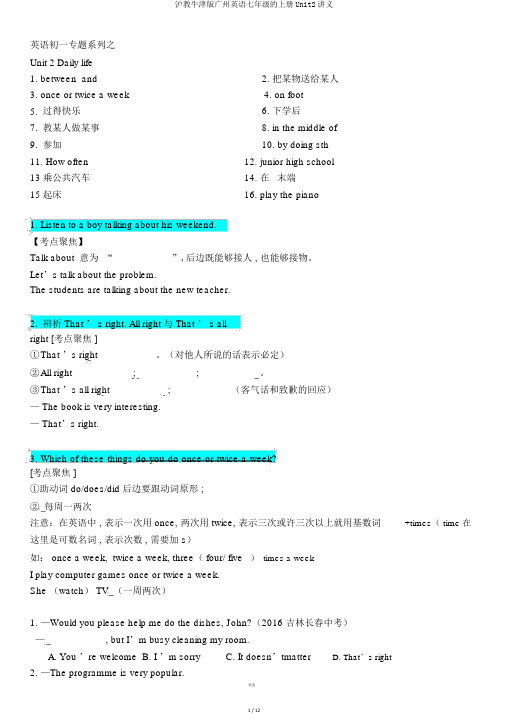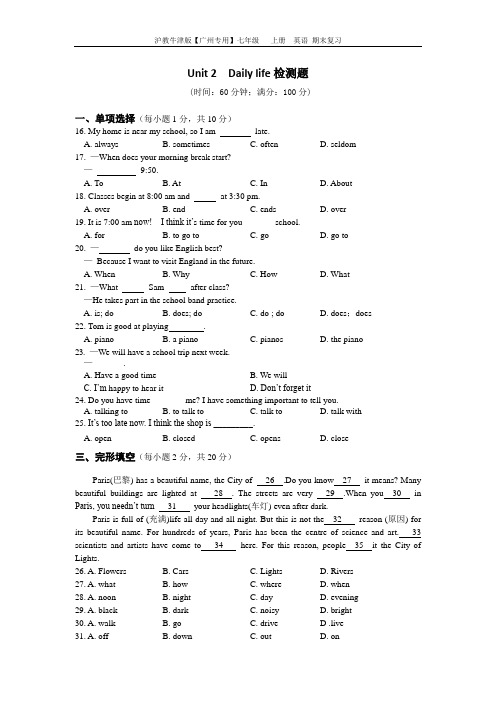广州英语(上海牛津版)复习资料『七年级上』
沪教牛津版广州英语七年级((上册))Unit2讲义全

英语初一专题系列之Unit 2 Daily life1. between…and… _________________________2. 把某物送给某人________________________3. once or twice a week_________________________4. on foot _________________________5. 过得愉快_________________________6. 放学后_________________________7. 教某人做某事_________________________ 8. in the middle of_________________________9. 参加_________________________ 10. by doing sth _________________________ 11. How often _________________________ 12. junior high school_________________________13乘公共汽车_________________________ 14. 在…末尾_________________________15起床_________________________ 16. play the piano _________________________1. Listen to a boy talking about his weekend.【考点聚焦】Talk about意为“___________”,后面既可以接人, 也可以接物。
Let’s talk about the problem.The students are talking about the new teacher.2. 辨析That’s right. All right与That’s all right[考点聚焦]①That’s right ___________。
广州七年级上册英语沪教牛津版U1复习

词组close to (在空间、时间上)接近go to school 去上学(be) good at 擅长make friends with 与…交朋友all over 遍及‘d like to=would like to 愿意句型What does …. mean? …是什么意思?… is far away with …. . 某处离某处很远。
What do/does sb do? 某人是做什么工作的?I’d like to do … . 我想做某事。
语法特殊疑问句不定冠词知识点◆German 作“德国人”时复数形式直接加-sGermany 意为“德国”◆ask sb about sth 就某事询问某人ask sb for sth 向某人要某物◆sound 作“声音”时是可数名词sound 还可以作“听起来”后接形容词、名词或介词短语作表语,表示某种情况或状况◆complete 作“完成”是及物动词,后接名词或代词作宾语◆mean 名词形式是meaningWhat does … mean? = What’s the meaning of…? = What do you mean by …? 都表示“…是什么意思?”◆listen to music listen不及物动词,后接宾语时,要加to◆play basketball 球类运动前不用加the,乐器前必须加the◆at the age of 在…几岁时◆favorite 可用作可数名词,意为“最喜欢的人或物”◆dream a dream of 一个…的梦想My dream is to … . 我的梦想是…。
◆everyone & every one everyone 只指每个人,其后不能接of短语every one 既可指人也可指物,其后可接of短语◆“by+表示交通工具的单数名词”构成表示交通方式的介宾短语by car by bike◆Why…? Because…. 在英语中,关联词不可以一起使用,because和so,although和but等等◆be friendly to 意为“对…友好”friendly是形容词不是副词◆many & much & a lot of many修饰可数名词much修饰不可数名词 a lot of修饰可数名词复数和不可数名词◆be good at 意为“擅长,在某方面做得好”= do well inbe bad/poor at = do badly in =be weak in “不擅长、在某方面做得不好”◆need sth意为“需要…”need to do sth 意为“需要做某事”◆pay attention to 意为“注意”,to 是介词◆Japanese 意为“日本人”单复数同型◆start with 意为“以…开始,开头”=begin with;◆What do/does sb do? 某人是做什么工作的?=What be sb?=What’s your job?◆hope to do 意为“希望做某事”hope that +从句意为“希望…”◆hear from 意为“收到…的来信”write to “写信给…”◆decide to do 意为“决定做某事”decide that +从句意为“决定…”◆in+语言意为“用…(语言)”◆用英语写地址时,应先写房子的门牌号,再写街道,然后写城市名称,最后写国家◆reference book 意为“参考书”◆on the Internet 注意要用on。
沪教牛津版广州英语七年级的上册Unit2讲义

英语初一专题系列之Unit 2 Daily life1. between and _________________________2. 把某物送给某人 ________________________3. once or twice a week_________________________4. on foot _________________________5. 过得快乐 _________________________6. 下学后 _________________________7. 教某人做某事 _________________________ 8. in the middle of _________________________ 9. 参加 _________________________ 10. by doing sth _________________________ 11. How often _________________________ 12. junior high school _________________________ 13 乘公共汽车 _________________________ 14. 在末端 _________________________15 起床 _________________________ 16. play the piano _________________________1. Listen to a boy talking about his weekend.【考点聚焦】Talk about 意为“___________”,后边既能够接人 , 也能够接物。
Let’s talk about the problem.The students are talking about the new teacher.2.辨析 That ’ s right. All right 与 That ’ s allright [考点聚焦 ]①That ’s right___________。
上海版牛津英语七年级 上 unit3单元知识点及练习

复习unit3 单词、短语、重点句子和语法一、单词:核心词汇名词可数名词field — a field — two fieldsquiz — a quiz —three quizzesa ground — four groundsland — a land — two landsproblem — a problem — four problemsFact — a fact — several facts不可数名词the Earth(地球)— the Moon(月亮) — the Sun(太阳)pollution(n.)— pollute(v.)=make sth dirtyenergy (n.) — clean energy(清洁能源)— heat energy(热能)二、短语/固定搭配:1、短语:provide …with…put…into…find out throw awaybe covered by on earthin the sky a lot ofmake energy of coursefor example one quarterthree quarters at hometake a look come fromfind out different types ofin the end get cooler2、固定搭配:call sth. sth.provide sb. with sth.stop doing sth.it be +形容词+ for sb. +to do sth.let sb. do sth.help sb. do sth.ask sb. (to) do sth.keep sb. + 形容词三、经典句型:There are also many people like you and me on earth.It is important for us to protect the earth for our future.What is the weather like in different places on earth?四、重点短语1.protect the Earth保护地球protect sb/sth from doing我们必须保护那片森林免受火灾。
(完整word版)沪教牛津版【广州专用】七年级 上册 英语 期末复习 Unit 2

38.Which is WRONG?
A.Mr.Green liked to lend his books to the learned persons.
B.When Mr.Green came back home from the bookshop,he often did some reading.
“Your books are not interesting at all,”said the woman,“I want a delicious one.”
“That’s easy,”Mr.Green smiled.He brought out a cookbook and said,“Here you are,madam.”
四、阅读理解(每小题2分,共20分)
A
Mr.Green once worked in a big company.He was quite busy so that he couldn’t do any reading.So he gave up his job and opened a bookshop in the center of the town.It wasn’t big but all the books were nice and most people liked to buy some there.When the shop was closed,he could read at home.He knew a lot and many learned people were glad to make friends with him.
A. Have a good timeB. We will
广州英语(上海牛津版)复习资料『七年级上』

点击朗诵外语-需要启用宏后才能使用朗诵功能启用方法:先启用编辑,然后启用宏内容。
2003版启用方法如下:工具→宏→安全性→低或中→重启文档→启用宏)不会启用宏?点击查看帮助!上上上Unit1 play在于棋类在于棋类在于棋类在于棋类、、、、球类等运动球类等运动球类等运动球类等运动搭配时名词不用加定冠词搭配时名词不用加定冠词搭配时名词不用加定冠词搭配时名词不用加定冠词the。
1.My hobby is playing chess. 1.我的爱好是下棋。
work as担任担任担任担任……工作工作工作工作2.He works as an accountant in London. 2.他在伦敦当会计师。
be keen on热衷于热衷于热衷于热衷于3.I am keen on sports 3.我热衷于体育运动。
4.He is keen on music. 4.他热衷于音乐。
enjoy doing sth. 喜欢做某事喜欢做某事喜欢做某事喜欢做某事5.She enjoys playing the piano after school. 5.他喜欢放学后弹钢琴。
(be )in glasses= wear glasses戴着眼镜戴着眼镜戴着眼镜戴着眼镜6.She is in glasses= She wears glasses. 6.她戴着眼镜。
be happy to do sth.很高兴做某事很高兴做某事很高兴做某事很高兴做某事7.I’m happy to be your penfriend. 7.我很乐意左你的笔友。
8.Thery’re happy to help us. 8.他们很乐意帮我们的忙。
拓展拓展拓展拓展::::be + adj. +to do sth. 做某事感到做某事感到做某事感到做某事感到……be good at 擅长于擅长于擅长于擅长于……9.I’m good at English. 9.我英语很好。
英语(上海牛津版)复习资料『七年级上』.docx
Unitl play 在于棋类.球类等运动搭配时名词不用加定冠词the 。
1. My hobby is playing chess. work as 担任 ... 工作2. He works as an accountant in London.be keen on 热衷于3.1 am keen on sports4. He is keen on music ・ enjoy doing sth.喜欢做某事5.She enjoys playing the piano after school. 5.他喜欢放学后弹钢琴。
(be )in glasses= wear glasses 戴着眼镜6.She is in glasses= She wears glasses ・ behappy to do sth.很高兴做某事7.Fm happy to be your penfriend.&Thcrylc happy to help us. 拓展:be + adj. +to do sth.做某事感到 .....be good at 擅长于 ....9・I'm good at English.Unit2one of +n ・(复数)是 . 之一1. Cheng Na, 15 , is one of the top studentsin Guangzhou.work on 从事2. Then I go to my office and continueworking on my games ・arrive , get to , reach 均可表示"到达”3. (1) arrive 作不及物动词,后而不可以立接跟农示地点的名词。
(2) arrive in+比较大的地方(国家城市) (3) arrive at+小地方(工厂村庄公园学校) (4) get to 后而跟地点名词或代词。
6 •她戴着眼镜。
广州市初一英语上沪教牛津版U5复习资料
U5词组thousands of 数以千计的on the moon 在月球上句型How far…?…..多远?I am one of the +序数词+名词to do sth. 我是第几个去做某事的…中的一员。
How long will it take to do sth? 做某事要花多长时间?It will take sb 时间to do sth. 做某事将花费某人多少时间。
语法一般现在时知识点◆How far…?It’s …meters/kilometers from… to …. 从…到…有多远?从…到…有…米/千米。
◆the 定冠词①特指双方都知道的人或物②重复提到上文已提及的人或物③专有名词④放在形容词最高级或序数词前⑤西洋乐器前◆be/feel nervous about/of sth. 意为“对…感到紧张”◆leave 名词,还可指“请假”ask for leave 意为“请假”◆take…to…意为“把…带到…”◆can’t wait 意为“迫不及待”,其后常用介词for can’t wait to do sth 意为“迫不及待做某事”◆地点/人+数词+里程单位(+away)+from/to 表示地点/人距…多远◆tie 及物动词,意为“系,拴,捆,绑”,常与to连用,表示把…系在…上,tie的现在分词是tying◆breathe 动词,意为“呼吸”名词为breath◆as adj./adv.(原级)as one can=as…as possible◆enough 形容词,意为“足够的”修饰名词时,enough置于其前其后都可以;作副词时,意为“足够地,充分地”,只能放在形容词或副词的后面◆adj. enough to do 意为“足够…来做…”◆bring back 意为“带回,归还”还可意为“使…回忆起”◆such as & for example such as和后面的例子不用逗号隔开●for example做插入语,用逗号隔开◆something 不定代词,意为“某事,某物”形容词修饰something时要放在它的后面,不定代词something做主语时谓语动词要用第三人称单数◆feed sth to sb 意为“用食物喂某人或动物”feed sb on sth 意为“给某人或动物喂食物”◆in a moment 意为“立刻,马上”◆ a large amount of 修饰不可数名词,其短语做主语时,谓语动词用单数◆hundred thousand million 等表示不确切的数目时,要用复数形式,且与of连用,其前不能加具体的数词;前面如果有具体的数词,不能在它们的后面加-s◆send up意为“发射”。
牛津上海版七年级英语上册Unit1重点知识复习及练习
2) 形容词比较级+than the other+复数名词。
例如:Asia is bigger than the other continents on the earth.亚洲是地球上最大的洲◆形容词的常用结构:◇a + adj + n a tall boy ◇be + adj. He is tall.◇keep/find/make/think… it adj. to / that …… ◇be + as + adj. + as do + as + adv. + as1)形容词在句子中的句法作用及位置:⑴ 作定语,放在名......词的前面....,.修饰名词。
结构:a/an/ …_______ 名词 ★ 后置的情况:修饰复合不定代词时放在代词之后。
如:Something serious has happened to him .(他发生了严重的事故) 1. Every minute there is _____going on here.A. exciting somethingB. something excitingC. exciting anythingD. anything exciting 2. This river is about 5 feet ________. A. deep B. widely C. depth D. Length★ 少数形容词只能作定语这些形容词包括 little, live , elder, eldest 等,只能作定语,不能作表语。
例如:(正)My elder brother is a doctor. (误)My brother is elder than I. (正)This is a little house.(误)The house is little. (正)Do you want live fish or dead one?(误)The old monkey is still live.⑵作表语时放在连系动词之后,构成系表结构。
准初一生预习:七年级上册英语unit1重点单词短语及语法句型
准初一生预习:七年级上册英语unit1重点单词短语及语法句型以下内容是来自广州(深圳上海)牛津版的英语教材整理而成,供大家暑假预习用!今天先学7A UNIT 1 Making friends的内容!家长可以帮孩子收藏!Ⅰ重点单词:World n. 世界 country n. 国家 Japan n.日本Germany n. 德国 German adj.德国的 n.德国人grammar n.语法 blog n. 博客 sound n. 声音Everyone n.人人(谓语动词要用单数)Hobby n.爱好(复数hobbies) age n. 年龄elder adj. 年长的 dream n. 梦想 complete v. 完成Us pron.我们 yourself pron.你自己 friendly adj. 友爱的engineer n. 工程师 flat n.公寓 mountain n. 山Ⅱ重点短语:1.colse to 接近 = near 反义词:far (away)from 远离2.Go to school 去上学3.Be good at 擅长 =do well in 反义词:be bad /poor at=do badly in不擅长4.Make friends with 与……交朋友 make friends 交朋友5.All over 遍及6.I’d like to=would like to 愿意Ⅲ重点句型:1.what does···mean?2.welcome to3.I like···because···4.My dream is to be··?5.How old is/are ····?6.What does ····do?详细讲解:1.Read a German girl’s blog。
- 1、下载文档前请自行甄别文档内容的完整性,平台不提供额外的编辑、内容补充、找答案等附加服务。
- 2、"仅部分预览"的文档,不可在线预览部分如存在完整性等问题,可反馈申请退款(可完整预览的文档不适用该条件!)。
- 3、如文档侵犯您的权益,请联系客服反馈,我们会尽快为您处理(人工客服工作时间:9:00-18:30)。
7A上Unit1play 在于棋类、球类等运动搭配时名词不用加定冠词the。
1.My hobby is playing chess. 1.我的爱好是下棋。
work as担任……工作2.He works as an accountant in London. 2.他在伦敦当会计师。
be keen on热衷于3.I am keen on sports 3.我热衷于体育运动。
4.He is keen on music. 4.他热衷于音乐。
enjoy doing sth. 喜欢做某事5.She enjoys playing the piano after school. 5.他喜欢放学后弹钢琴。
(be )in glasses= wear glasses戴着眼镜6.She is in glasses= She wears glasses. 6.她戴着眼镜。
be happy to do sth.很高兴做某事7.I’m happy to be your penfriend. 7.我很乐意左你的笔友。
8.Thery’re happy to help us. 8.他们很乐意帮我们的忙。
拓展:be + adj. +to do sth. 做某事感到……be good at 擅长于……9.I’m good at English. 9.我英语很好。
Unit2one of +n.(复数)是……之一1.Cheng Na,15 , is one of the top students 1.程娜,15岁,是广州市的一名优等生。
in Guangzhou.work on 从事2. Then I go to my office and continue 2.然后我又去办公室,继续编写我的电脑游戏。
working on my games.arrive , get to , reach 均可表示“到达”3.(1)arrive作不及物动词,后面不可以直接跟表示地点的名词。
(2)arrive in+比较大的地方(国家城市)(3)arrive at+小地方(工厂村庄公园学校)(4)get to 后面跟地点名词或代词。
e.g. get to school; get home ;get there ;(前不用to)(5)reach作及物动词,后面可直接跟宾语e.g. reach schoolfavourite 做喜欢的……本是是最高级。
4.Her favourite sport is table tennis. 4.她最喜欢的运动是兵乓球。
Unit3happen to 遇到1.What happened to you? 1.你遇到了什么事?run away跑开2.He said good-bye and ran away. 2.他说声再见,跑开了。
pick up拿起3.Then he hurried to an ice cream shop, 3.接着他匆忙来到一家冰淇淋店,拿起电话picked up the phone and quickly called 110. 迅速拨打110报警电话。
拓展:hurry v. 匆忙hurry off 匆忙离开hurry up 赶快hurry n. 匆忙in a hurry 匆忙的stay up late醒来4.The children stayed up late for their 4.孩子们不去睡觉,还在看电视。
favourite TV programme.be angry with生气5.She is never angry with others. 5.他从不生别人的气。
be sure to do肯定6.I’m sure to get there on time. 6.我肯定能准时到达那里。
think about考虑7.Think carefully about the question 7.回答问题前仔细考虑一下。
before you answer it.walk around 四处走,相当于:walk ,around: walk about8.The old man has nothing to do and 8.老人无事可做,总是四处走的。
always walks round拓展: look round四处看on one own ’s独自9.I can complete the project on my own. 9.我能独自完成这个课题。
Unit4used to do过去常常做…..1.I used to get up at 7:00, but now 1.我过去常常是7点起床,I get up at 6:30 但现在是6:30起床。
with用;以2.clean it with water.用水洗另in也有同样用法,但多表示使用……媒体、材料、手段等。
3.write in ink用墨水写4.write in pencil用铅笔写billions of数以十亿计,类似的结构还有:hundreds of 数以百计; thousands of 数以千计;millions of 数以百万计。
see sb. /sth. 和see sb./sth. doing sth.都表示“看见某人(某物)做某事”,但两者有区别。
前者表示看到动作的全过程,指一个动作已经完成,常用瞬间动词;后者表示看到动作在进行中,是正在持续,动用持续性动词。
5 saw him come into the room. 5.我看见他进了那间房间。
6.Jack saw an old man fishing by the lake. 6.杰克看见一个老人正在湖边钓鱼。
as well as除…..之外,还7.He can speak French as well as English. 7.他除了会讲英语,还会讲法语。
8.My brother as well as my parents likes 8.除了我父母外,我弟弟也喜欢下棋。
playing chess.all over the world 全世界9.Taking photographs is favourite hobby o -9.照相时全世界很多人特别喜欢的爱好。
f many people all over the world.e.g. all the country全国all over the city全市辨析:such as , for example譬如,比如(1)for example 强调“举例”说明,而且一般只举同类人或物中的一个作为插入语,且用逗号隔开,可置于句首、句中、句末。
10.Many people here , fore example ,John, 10.这里有许多人,例如约翰,很喜欢喝咖啡。
would rather have coffee.(2)such as 用来“罗列”同类人或物中的几个例子,可置于被列举的事物与前面的名词之间,但其后边不能用逗号。
11.Many of the English programmes are well 11.其中有许多英语节目,如《跟我学》、《跟我学received, such as Follow Me Science 科学》,就很受欢迎in the past在过去12.Many people lived a sad life in the past. 12过去很多人过着悲惨的生活。
make a lot of friends广交朋友;make friends (with sb.)(和某人)交朋友13.She made a lot of new friends in 13.她在新学校里交了很多新朋友the new school.make friends (with sb.)交朋友14.Do you want to make friends with us? 14.你想和我们做朋友吗??at the weekend在周末15.At the weekend, I fly my planes at a park 15.在周末时,我在我家附近的公园里放飞机near my home.use to do 与did not use过去常常做。
16.She used to go to school by bus. 16.她过去常常乘公共汽车上学。
She did not see to go to school by bus. 她过去不常乘公共汽车上学。
17.Did she use to go to school by bus? 17.她过去常乘公共汽车上学吗?How did she use to go to school? 她过去怎么上学的?think of 考虑到……18.What can you think of when you see the 18.你看到这幅图的时候会想到些什么?picture?19.He never thinks of others. 19.他从不考虑别人。
Unit5learn about得知1.Where did you learn about the news? 1.你从那儿得知这个消息。
be famous for 因……而闻名2.She is famous for her books. 2.他因写书而闻名。
at the same time同时3.He works in a factory. At the same time , 3.他在一家工厂上班。
同时,她还在一家餐馆做兼he has part-time job in a restaurant. 职。
in one’s life在某人的一生中,在某人的生命里头4.She saved many people in her life. 4.她一生中左拯救救了无数的人。
all one’s life 用一生的时间(做某事)5.The old man lived in the countryside all 5.这位老人一生都住在农村。
his life.work out理解,想出,弄清楚6.How can we work out this problem? 6.我们怎么才能解开这个问题?figure out理解,想出,弄清楚7.We must figure out how to do it. 7.我们必须弄清楚要怎么做。
be full of 充满,相当于be filled with8.The house is full of people. 8.屋里挤满了人。
according to 根据9.According to many engineers ,computers 9.根据许多工程师说法,电脑恼会越来越小。
